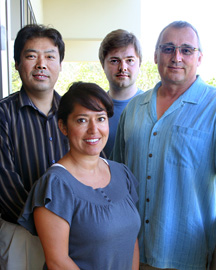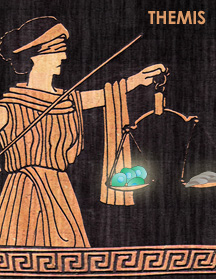

Scientists Uncover a New Protein Necessary for the Proper Formation of the Immune System
By Laura Bonetta
Armies of immune cells patrol our blood, fending off invading viruses and bacteria, and even destroying cancer cells. Researchers have elucidated intricate cascades of signals that orchestrate the step-by-step development of different immune cells, endowing them with unique functions and specificities. Scripps Research Institute Professor Nicholas R. J. Gascoigne and colleagues have discovered a critical signal that has remained elusive—until now.
In a paper published in Nature Immunology on July 13, 2009, the researchers show that a newly discovered protein, dubbed Themis (for thymocyte expressed molecule involved in selection), provides a signal necessary for one set of immune cells, called T cells, to form. Some immune diseases may ultimately be explained by defects in this mysterious protein.
"It's amazing that this molecule has been missed for so long," says Gascoigne. "People have been studying T-cell development signaling cascades for some 25 years."
An Elusive Signal
Gascoigne's group discovered this new player while they were looking for proteins produced specifically in the thymus, an organ lying behind the breastbone, where T cells grow from immature precursors. While the researchers identified several thymus-specific proteins, this one looked particularly interesting.
One of the characteristics that first caught Gascoigne's attention was that Themis is produced when unspecialized cells in the thymus—called thymocytes—are just starting to take on a T-cell identity. This very narrow time window of production suggested the protein might be important during an early stage of T-cell formation.
But when the scientists looked at the sequence of amino acids that make up the protein, it did not bear any resemblance to that of any known proteins.
"Nothing was known about it, which can be both good and bad," says Gascoigne. "We had no clues from its sequence to suggest what it did."
To gain insights into Themis' function, the scientists engineered mice lacking the corresponding gene. The resulting Themis-deficient mice had fewer mature T cells compared to normal mice, indicating that T-cell formation had been impaired.
T Cell Development
There are two main types of immune cells. B cells work chiefly by releasing antibodies – molecules that ambush foreign proteins or bits of proteins, known as antigens, circulating in the blood. T cells, instead, attack cells that have been infected by microbes or cells distorted by cancer.
All T cells have on their surface a T-cell receptor that typically recognizes antigens that are carried on the surface of the body's cells by certain molecules called major histocompatibility complex (MHC) proteins. Other receptors on the surface of T cells assist the T-cell receptor in binding to different MHC molecules.
For example, a subset of T cells, called T-helper cells, which recognize foreign antigens and then "recruit" other immune cells to the attack, have the CD4 receptor on their surface. T-cytotoxic cells, which can attack rogue cells on their own, have the CD8 receptor.
When immature T-cell precursors arrive to the thymus, they are blank slates and do not express any of these receptors on their surface. The development of mature TCR and CD4 or CD8-bearing T-cells involves several carefully timed steps, including two critical "selections."
The first, called positive selection, eliminates developing T-cells that have TCRs that cannot recognize the body's own MHC and are thus of no use. The next step, negative selection, eliminates T-cells whose T-cell receptors bind MHC too strongly and may present a danger to the body. Cells that bind MHC too strongly could attack the body's own proteins causing autoimmune disease.
"It is a Goldilocks scenario; you have to select cells that bind MHC just right," says Gascoigne.
An Overlooked Pathway
Collaborating with Oreste Acuto's group at the University of Oxford, Gascoigne's team found that Themis is necessary for both selection steps, but especially during positive selection.
"Themis ensures that the cells get a full signal from the T-cell receptor to grow and survive," explains Gascoigne. "Without Themis you get less of a developmental signal and we see a big change in positive selection."
Themis may serve to fine-tune the signal from the T-cell receptor—an important process to get right because otherwise conditions like autoimmune diseases or immunodeficiencies result. Indeed, Gascoigne suspects that there may be people afflicted by such diseases who carry mutations in the gene encoding Themis.
"This work has told us is that there is another pathway in T-cell development that has been overlooked until now," says Gascoigne. "We suspect it will be critical to T-cell development and function."
To better understand Themis' function, Gascoigne is now trying to unravel what different parts of the molecule do and to identify what proteins Themis interacts with.
Two other research groups will be publishing similar results in the same issue of Nature Immunology, having discovered Themis independently, and using different strategies.
The first authors of the study, "Themis Controls Thymocyte Selection Through Regulation of T Cell Receptor-Mediated Signaling," are Guo Fu and Sébastien Vallée of The Scripps Research Institute. In addition to Gascoigne and Acuto, additional authors of the study include Vasily Rybakin, Marielena V. McGuire, Jeanette Ampudia, Paul R. Fallen, John A. H. Hoerter, Anil Munshi, Yina H. Huang, Jianfang Hu, Howard S. Fox, and Karsten Sauer from The Scripps Research Institute and Claudia Brockmeyer and Mogjiborahman Salek from the University of Oxford. For more information, see http://www.nature.com/ni/journal/vaop/ncurrent/abs/ni.1766.html.
Funding for this study was provided by the National Institutes of Health, the Wellcome Trust, and the Concern Foundation.
Send comments to: mikaono[at]scripps.edu

"It's amazing that this molecule has been missed for so long," says Professor Nicholas Gascoigne (right), shown here with Research Associate Guo Fu, Research Assistant Jeanette Ampudia, and Rsearch Associate Vasily Rybakin (left to right). Photo by Kevin Fung.

The newly discovered immune system molecule is named Themis, which is an acronym for "thymocyte expressed molecule involved in selection" as well as a reference to the Greek goddess Themis, who was believed to be responsible for natural law and order. Illustration by Kevin Fung.
